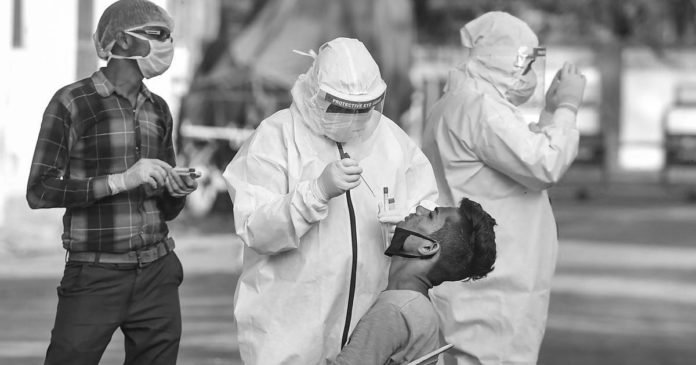Two cases of Covid-19 Omicron variant was reported in Mumbai on Monday, taking India’s total tally of the new coronavirus variant to 23.
The first two cases were reported in Karnataka, followed by one in Jamnagar (Gujarat) and another in Maharashtra. Later on Sunday, seven cases were reported in Maharashtra’s Pune district, of which six belonged to the same family. In Jaipur, nine cases of the Omicron variant were confirmed — all of whom had attended the same wedding. In Delhi, a man in his 30s was found to be infected with the new variant and admitted to the Lok Nayak Jai Prakash Narayan hospital.
Several states have stepped up vaccination, surveillance and containment measures as India detected 21 cases of Omicron variant of coronavirus. Aviation Minister Jyotiraditya Scindia on Monday directed Delhi airport operator DIAL to implement better crowd management strategies after passengers complained of chaos and crowding at its terminal following the implementation of new coronavirus-related travel guidelines. Delhi Chief Minister Arvind Kejriwal urged the public not to panic and follow Covid appropriate behaviour.
Meanwhile, Tamil Nadu government has taken preventive measures including door-to-door vaccination in wake of Omicron variant. Karnataka Chief Minister Basavaraj Bommai said that the state is fully prepared to control the new variant. Maharashtra Deputy Chief Minister Ajit Pawar on Monday said there is need to take a decision at the national level on whether a booster dose of the vaccine is required to curb the pandemic. “The Centre too should take a strict position on patients coming from abroad in various states. It must be ensured rules are observed strictly at our international airports,” he added.
India recorded 8,306 new Covid-19 cases, according to the Health Ministry’s press release in the last 24 hours ending 8 am on December 6. As many as 211 new deaths were reported in the country. With 8,834 recoveries, the active cases in India stood at 98,416.
More about Omicron
The Omicron variant has been called a variant of concern by WHO based on studies that shows it has several mutations.
Still a lot of research is underway to evaluate its transmissibility, severity and reinfection risk.
The Omicron variant has been detected in several regions of the world. WHO reports that the likelihood of the Omicron variant spreading further globally is high.
It is not currently known if the Omicron variant is more or less severe than other strains of COVID-19, including Delta. Studies are ongoing and this information will be updated as it becomes available.
It is not yet clear whether Omicron can spread more easily from person to person compared to other variants, such as Delta.
However, being vaccinated and taking precautions such as avoiding crowded spaces, keeping your distance from others and wearing a mask are critical in helping to prevent the spread of COVID-19, and we know these actions have been effective against other variants.
Researchers are looking into any potential impact the Omicron variant has on the effectiveness of COVID-19 vaccines. Although information is still limited, WHO believes it is a reasonable assumption that the currently available vaccines offer some protection against severe disease and death.
It is also important to be vaccinated to protect against the other widely circulating variants, such as the Delta one. When it’s your turn, make sure to get vaccinated. If your vaccination involves two doses, it’s important to receive both in order to have the maximum protection.
According to WHO, early evidence suggests that people who have previously had COVID-19 could be reinfected more easily with Omicron, in comparison to other variants of concern. Information is still limited though and we will share updates as it becomes available.
Source: UNICEFRead more Health News
Latest update Omicron

